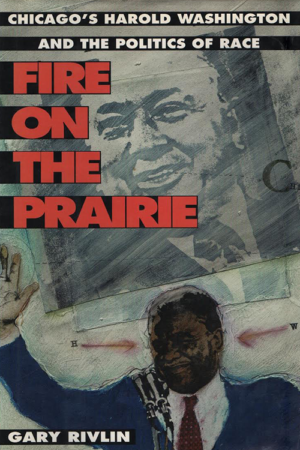Fire On The Prairie
- Fire On The Prairie
- Praise
-
Published by Henry Holt, this book, my first, won the Carl Sandburg Award for Non-Fiction in 1992.It also won the Chicago Sun-Times’s Non-Fiction Book of the Year award that same year. “If we crack Chicago, then we crack the world,” Martin Luther King, Jr. said, and then black empowerment “would take off like a prairie fire across the land.” The book was a Chicago best-seller.
 A NEW-AND-IMPROVED FIRE: 25 percent shorter than the original plus a new Foreword by columnist Clarence Page and new Introduction by Prof. Larry Bennett, both of whom trace Barack Obama’s rise to Harold Washington
A NEW-AND-IMPROVED FIRE: 25 percent shorter than the original plus a new Foreword by columnist Clarence Page and new Introduction by Prof. Larry Bennett, both of whom trace Barack Obama’s rise to Harold WashingtonHear me talk with Studs Terkel about Fire on the Prairie in 1992.
-
“A master journalist’s fascinating chronicle of the Harold Washington mayorality.”
The Chicago Sun-Times“Gary Rivlin saw clearly what other journalists were blind to, and reported what they had non-reported. He was to the Chicago political scene what I.F. Stone was to the national picture.”
Studs Terkel“Colorfully, intimately, Fire on the Prairie shames and instructs as it entertains, weaving a skein of anecdotes and vignettes into a civic conversation about race and power.”
Jim Sleeper, The Washington Post Book World“Fire on the Prairie is a master journalist’s fascinating chronicle of the Harold Washington mayorality elections and the intervening ‘Council War.’ The book is rich in intriguing behind-the-scenes incidents. Rivlin makes the reader live those years.”
Leon Despres, The Chicago Sun-Times“A fascinating tale of racial hostilities and political betrayals.”
Black Enterprise“Gary Rivlin has woven a vivid and compelling story that helps to remind us all how the subject of race is always percolating below the surface, ready to explode. A wonderful book.”
Alex Kotlowitz, There Are No Children Here“Like Mike Royko’s Boss: Richard J. Daley of Chicago, Rivlin’s chronicle of Washington’s rise and power struggles has weathered the test of time as a classic Dickensian portrait of big-city politics and seismic racial, ethnic, and socioeconomic change.”
Clarence Page, a Pulitzer-prize winning syndicated columnist“a lively, nuanced, and engaging narrative.”
David Moberg, Newsday“A terrific new book.”
Village Voice“An engrossing, behind-the-scenes account.”
Publishers Weekly“Gary Rivlin’s FIRE ON THE PRAIRIE looks at Chicago, but it shows every major American city…. His book succeeds because he gives us the full richness of Chicago’s political life – from City Hall to neighborhood meetings, from back-of-the-limousine conversations to picket line chants.”
San Francisco Chronicle


